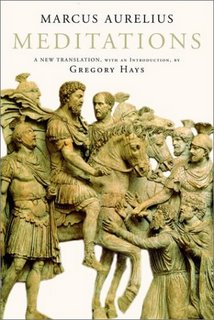 Meditations is a series of philosophical notes which was written by Roman emperor Marcus Aurelius sometime in the 2nd century A.D. That the book has survived for nearly two millennia is amazing. What's even better is that the wisdom of this work - almost every question asked or answered - is still as applicable today. The book (never intended for publication) is written as a series of notes by Marcus to himself. He writes observations, gives himself advice, debates with himself, records insightful observations by others, admonishes and motivates himself.
Meditations is a series of philosophical notes which was written by Roman emperor Marcus Aurelius sometime in the 2nd century A.D. That the book has survived for nearly two millennia is amazing. What's even better is that the wisdom of this work - almost every question asked or answered - is still as applicable today. The book (never intended for publication) is written as a series of notes by Marcus to himself. He writes observations, gives himself advice, debates with himself, records insightful observations by others, admonishes and motivates himself.This is by no means a cohesive or flowing work - the book almost reads like a personal blog. Marcus frequently revisits and circles around a few common identifiable themes throughout the book - the nature of the human mind, body and soul; leadership qualities; how one should react to death; the importance of work and ethics; the impermanence in nature; the insignificance of human acts and lives from a greater perspective; and so on. Yet I found this very style appealing - and very human. It shows how he struggles with himself to avoid and conquer excessive desires, anger, impatience, pride and laziness - problems that I (and many others, I presume) have had to deal with.
There are arguments put forth in the book which really made me sit up, think and take notice; and rethink my life in more ways than one. This is a sponge kind of book - the more you read it, the more you will absorb. There are easily times that you can just read one line and simply think for a good half an hour about it. My favourite line from the book - "Our worth is measured by the things we devote our effort to.".
Definitely a great read for anyone interested in philosophy (and by philosophy I mean practically analyzing people and life) and open to new ideas about living life. This book has also been greatly recommended for leaders and statesmen (Marcus Aurelius was Caesar, after all!).
A brief note: There are many translations of this book available, and some are online. The Gregory Hays translation, however, is the newest in a generation and much more readable than others I tried. He also gives an excellent (if a tad long) introduction to the times and Marcus' life to put the book into context. It was definitely worth the US$10 that I paid for it.